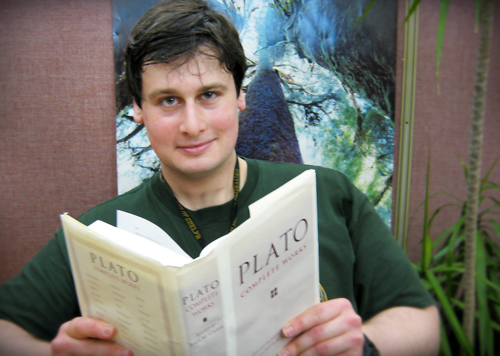
For the third year running, the coveted Harry C. Maynard Scholarship for a classics essay has been awarded to a University of Guelph undergraduate student in the School of Languages and Literatures. Justin Singer, now in the final year of his classics and history double major, plans to put the scholarship towards his graduate studies.
For the Maynard scholarship contest, students were required to select one or two current global issues and discuss the insights and teachings of the classical world, which might help to address these concerns today.
“It’s quite an honour,” says Singer. “I entered the essay contest because new challenges are exciting. I looked at it as an opportunity to expand my knowledge and re-examine previously accepted notions. I want to contribute as much as possible to the solution of problems pertaining to the natural environment. I think that Plato and other brilliant thinkers of classical antiquity offer a wealth of wisdom that might be implemented in response to the issues facing modern-day society.”
Awarded by the Ontario Classical Association, the annual scholarship recognizes top scholarly writing by the province’s undergraduate students. Singer’s winning essay, “The Guardians of the Earth: The Implementation of the Platonic Principle of Justice for the Protection of the Natural World,” drew on ancient and modern approaches to discuss environmental protection.
In his essay, Singer sought to reconcile the central principles of the theoretical society detailed in Plato’s Republic with the realities of the human experience. “The guiding concept of the Republic was the idea of governance by those possessing the highest degree of philosophical wisdom. I believe this principle may be applied within a democratic system if the majority of citizens agree to strive for the philosopher-ruler ideal. Plato, speaking through Socrates, stated that a just society was one governed by those who were themselves ruled by rational thought. In his view, philosophers, defined by their devotion to the true essence of reality, their abhorrence of false assertions, and their ability to suppress their impulses for self-gratification, were the most suitable individuals to serve as the rulers of the republic.”
Singer’s essay offered an innovative approach to addressing environmental concerns. “I proposed a concept inherited from classical antiquity as a possible measure for minimizing and reversing human impact upon the natural world in the present day.”
He is a member of Guelph Students for Environmental Change, an association that promotes campus sustainability efforts such as “Wasteless Wednesdays,” offering free, fair-trade organic coffee to students who bring a reusable mug.
The greatest inspiration for his interest in environmental protection comes from his classical philosophy studies, Plato in particular.
“Plato teaches us that if we know the correct course of action in a particular situation, it is our responsibility to behave accordingly,” says Singer. “Today, the natural environment continues to suffer drastic damage as a result of human activity, and the survival of life on Earth hangs in the balance as a result of hasty and short-sighted decisions.
“The philosophy of Aristotle has also influenced me. He taught that we should act in such a way as to attain peace of mind, that is, to enjoy freedom from concern and suffering. One of the most significant ways that we can achieve this state is by protecting the natural environment, thereby ensuring that we need not fear for mankind’s survival on the planet.”
Singer maintains that we can also learn from the Meditations of the Roman emperor Marcus Aurelius, in which the emperor advises us to “Frequently consider the connexion of all things in the universe and their relation to one another.” This principle, Singer believes, has the potential to improve our ability to understand that we do not exist separately, but as small parts of a larger organism.
Singer recently developed and launched a not-for-profit website, www.donthaveacow.ca, which provides information on the environmental impact of livestock production.
“My reason for becoming a vegetarian is closely related to environmental protection. Even during the Classical period in Greece, some of the greatest minds of the age, such as Plato, recognized the far-reaching benefits of abstaining from meat consumption. In the Republic, for instance, Plato explains the sustainability of vegetarianism by discussing how it may prevent resource-motivated conflict and reduce the demands placed upon the environment.”
Singer has always been intrigued by both science and history. “When I reached high school, I really enjoyed studying philosophy because it’s a field of study that can be applied to other academic disciplines. But that didn’t make it easy for me to choose what to take at university.”
Singer visited the U of G campus and examined the programs of study carefully before deciding which university to attend. “I felt that in some respects Guelph offered a broader range of history and classics topics of interest to me. There were more options. After taking a few classics courses, I knew this was what I wanted to concentrate on. I was inspired by professors O’Cleirigh, Sherwood and Walsh, who really brought to life the study of the Greeks and Romans in terms of history, culture, language, literature, political practices and philosophy.”
For Singer, the classics field is exceptionally complex and comprehensive.
“The intellectual developments of the classical world present a vast series of intricately interconnected ideas and paradigms, many of which have much to offer to the modern world; they have the potential to lead scholars on a wide range of fascinating interdisciplinary academic paths. In classical studies one must keep an open mind and search for connections that may lead to unexpected discoveries.”